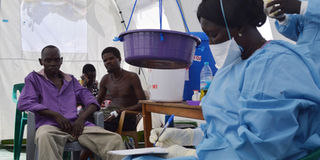Breaking News: At least 10 feared to have drowned in Makueni river
Cholera outbreak in South Sudan now contained

Patients suffering from cholera and medical staff sit at the Juba Teaching Hospital on May 20, 2014. Medical charity Médecins Sans Frontières (MSF) says there has been “a significant decline” in the areas the disease was first reported in May 2014. FILE PHOTO | NATION MEDIA GROUP
What you need to know:
- MSF says there has been “a significant decline” in the areas the disease was first reported in May 2014.
- This has been as a result of efforts by the South Sudanese government in collaboration with NGOs.
- MSF said it would continue watching the cholera situation in South Sudan but will redirect its attention to other health issues.
- It indicated that it vaccinated 350,000 people in Malakal, Minkamen and Juba as well as refugee in camps in Ethiopia.
The cholera outbreak that had affected more than 5,000 people in South Sudan has been contained.
Medical charity Médecins Sans Frontières (MSF) in its latest situation report says there has been “a significant decline” in the areas the disease was first reported in May 2014.
The charity’s South Sudan arm attributed the development to efforts by the South Sudanese government in collaboration with NGOs to combat the deadly waterborne disease through vaccinations and mobile medical care centres.
“It looks like the efforts of the Ministry of Health and other organisations including MSF have helped bring the epidemic under control,” Brian Moller, the head of MSF South Sudan Mission, said in a statement.
POOR LIVING CONDITIONS
“Deteriorating living conditions for hundreds of thousands of people, combined with the lack of functioning health facilities, created a perfect storm for the spread of the disease earlier this year,” the statement added.
The agency said it would continue to watch the cholera situation but will redirect its attention to other health issues affecting South Sudan.
The announcement could be good news for South Sudan in a year when Amnesty International, Human Rights Watch and several other NGOs in the country reiterated their call for a worldwide arms trade restriction with the world’s youngest nation following a conflict that broke out in December 2013.
Last week, Human Rights Watch claimed the South Sudanese army had used child soldiers during recent fighting against opposition forces in violation of international law.
USED CHILD SOLDIERS
The government allegedly used child soldiers in renewed fighting in mid-August 2014 in Bentiu, the capital of Unity State, and in the neighbouring town of Rubkona.
The conflict pitting President Salva Kiir’s loyalists against Riek Machar’s supporters has seen at least 10,000 people dead and more than 1.7 million displaced.
The UN had earlier said that 3.9 million people in South Sudan faced starvation and estimated that about $1.6 million (Sh140.8 million) was needed to assist the displaced.
MASSIVE CAMPAIGN
Cholera had killed 20 people before a massive campaign for vaccinations was launched by medical organisations.
On its website, MSF indicated that it vaccinated 350,000 people in Malakal, Minkamen and Juba as well as refugees in camps in Ethiopia.
Cholera vaccinations are not 100 per cent protective but increase the chance of survival by up to 65 per cent.
In August 2014, the two antagonists (Kiir and Machar) agreed to recommit to a ceasefire and agreed to continue with talks, which have been midwifed by the Intergovernmental Authority on Development (Igad).
South Sudan went into turmoil late 2014 when soldiers loyal to former vice president Riek Machar fought with those loyal to President Salva Kiir.
The violence broke out in the entire country mainly pitting the Dinka against the Nuer communities.




